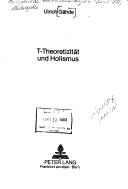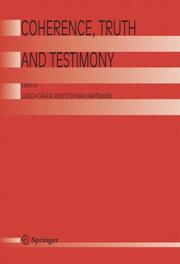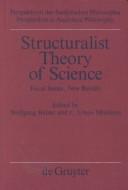| Listing 1 - 7 of 7 |
Sort by
|

ISBN: 3820475451 Year: 1983 Publisher: Frankfurt am Main Lang
Abstract | Keywords | Export | Availability | Bookmark
 Loading...
Loading...Choose an application
- Reference Manager
- EndNote
- RefWorks (Direct export to RefWorks)

ISBN: 1281107409 9786611107406 1402055471 1402044267 9048171253 Year: 2005 Publisher: Dordrecht, The Netherlands : Springer,
Abstract | Keywords | Export | Availability | Bookmark
 Loading...
Loading...Choose an application
- Reference Manager
- EndNote
- RefWorks (Direct export to RefWorks)
Coherence is a burgeoning topic of research. Diverse methodologies have been applied to shed light on the topic and its relevance to fundamental questions throughout philosophy. The collection brings together the full scope of this research in a single volume. The first group of essays attack the core topic of the book: coherence. Authors in this section take up the challenging and controversial task of measuring the coherence of an information set, while others criticize this endeavor. The second group of papers in the collection relate this foundational research to a wide array of epistemological and metaphysical challenges. For example, some papers consider the relationship between truth and coherence. Is coherence truth conducive, and if yes, under which conditions? A related issue taken up in this volume is the connection between coherence and testimony. Are we justified in believing coherent reports by independent, though only partially reliable witnesses more than a single report? If yes, under which conditions does this claim hold true? By the end of the book, the reader should have a comprehensive understanding of topic of coherence, the controversy surrounding it, and its implications across the discipline of philosophy.
Truth --- Philosophy. --- Coherence theory. --- Mental philosophy --- Humanities --- Coherence theory of truth --- Philosophy (General). --- Philosophy, modern. --- Philosophy, general. --- Modern Philosophy. --- Modern philosophy --- Coherence theory --- Modern philosophy.
Digital
ISBN: 9781402055478 Year: 2005 Publisher: Dordrecht Springer
Abstract | Keywords | Export | Availability | Bookmark
 Loading...
Loading...Choose an application
- Reference Manager
- EndNote
- RefWorks (Direct export to RefWorks)
Philosophy --- filosofie
Book
ISBN: 3050021632 Year: 1992 Publisher: Berlin Akademie Verl.
Abstract | Keywords | Export | Availability | Bookmark
 Loading...
Loading...Choose an application
- Reference Manager
- EndNote
- RefWorks (Direct export to RefWorks)
Book
ISBN: 9781402055478 Year: 2005 Publisher: Dordrecht Springer Netherlands
Abstract | Keywords | Export | Availability | Bookmark
 Loading...
Loading...Choose an application
- Reference Manager
- EndNote
- RefWorks (Direct export to RefWorks)
Coherence is a burgeoning topic of research. Diverse methodologies have been applied to shed light on the topic and its relevance to fundamental questions throughout philosophy. The collection brings together the full scope of this research in a single volume. The first group of essays attack the core topic of the book: coherence. Authors in this section take up the challenging and controversial task of measuring the coherence of an information set, while others criticize this endeavor. The second group of papers in the collection relate this foundational research to a wide array of epistemological and metaphysical challenges. For example, some papers consider the relationship between truth and coherence. Is coherence truth conducive, and if yes, under which conditions? A related issue taken up in this volume is the connection between coherence and testimony. Are we justified in believing coherent reports by independent, though only partially reliable witnesses more than a single report? If yes, under which conditions does this claim hold true? By the end of the book, the reader should have a comprehensive understanding of topic of coherence, the controversy surrounding it, and its implications across the discipline of philosophy.
Philosophy --- filosofie
Book
ISBN: 3110313685 9783110313680 9783110313604 311031360X 1306205506 3110313693 Year: 2013 Publisher: Berlin/Boston De Gruyter
Abstract | Keywords | Export | Availability | Bookmark
 Loading...
Loading...Choose an application
- Reference Manager
- EndNote
- RefWorks (Direct export to RefWorks)
Modern science is, to a large extent, a model-building activity. But how are models contructed? How are they related to theories and data? How do they explain complex scientific phenomena, and which role do computer simulations play here? These questions have kept philosophers of science busy for many years, and much work has been done to identify modeling as the central activity of theoretical science. At the same time, these questions have been addressed by methodologically-minded scientists, albeit from a different point of view. While philosophers typically have an eye on general aspects of scientific modeling, scientists typically take their own science as the starting point and are often more concerned with specific methodological problems. There is, however, also much common ground in middle, where philosophers and scientists can engage in a productive dialogue, as the present volume demonstrates. To do so, the editors of this volume have invited eight leading scientists from cosmology, climate science, social science, chemical engeneering and neuroscience to reflect upon their modeling work, and eight philosophers of science to provide a commentary.
Complexity (Philosophy) --- Science --- Normal science --- Philosophy of science --- Philosophy --- Emergence (Philosophy) --- Philosophy. --- methods --- methodology


ISBN: 9783110879421 9783110140750 Year: 2011 Publisher: Berlin ;; Boston De Gruyter
Abstract | Keywords | Export | Availability | Bookmark
 Loading...
Loading...Choose an application
- Reference Manager
- EndNote
- RefWorks (Direct export to RefWorks)
| Listing 1 - 7 of 7 |
Sort by
|

 Search
Search Feedback
Feedback About UniCat
About UniCat  Help
Help News
News